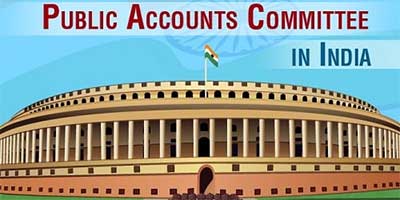Relevance: GS-2, Constitution and its laws
Key Phrases: Proportional Representation, Post-Mortem Work, Advisory
Why in News?
- The Public Accounts Committee (PAC) has recently completed its 100 years.
- PAC may be redesignated as Public Accounts and Audit Committee given the fact that audit review is also its core function.
About:
- The PAC is one of three Financial Parliamentary committees, with the Estimates Committee and the Committee on Public Undertakings being the other two.
- Article 105 (on Parliamentary privileges) and Article 118 (on Parliament's authority to make rules for governing its procedure and conduct of business) provide Parliamentary committees with their authority.
- PAC members are elected by the Parliament every year from amongst its
members according to the principle of proportional representation by means
of the single transferable vote.
- It presently comprises 22 members (15 members elected from the Lok Sabha and 7 members from the Rajya Sabha) with a term of one year only.
- A minister cannot be elected as a member of the PAC.
- The chairman of the PAC is appointed by the Speaker from amongst its members.
- Until 1967, the chairman of the PAC belonged to the ruling party. However, since 1967 it has become a convention to select a person from the Opposition for the chairman post.
Establishment:
- The Public Accounts Committee was introduced in 1921 after its first mention in the Government of India Act, 1919 also called Montford Reforms.
- The Public Accounts Committee is now constituted every year under Rule 308 of the Rules of Procedure and Conduct of Business in Lok Sabha.
Functions:
- PAC examines the annual audit reports of the Comptroller and Auditor
General of India (CAG), which are tabled before the Parliament by the
President.
- The CAG is empowered to submit three audit reports to the President,
namely:
- audit report on appropriation accounts,
- audit report on finance accounts and
- audit report on public undertakings
- The CAG is empowered to submit three audit reports to the President,
namely:
- The committee probes into the public expenditure not merely from legal and procedural point of view to discover technical irregularities but also from the point of view of economy, prudence, wisdom and propriety to bring out the cases of corruption, waste, loss, extravagance, inefficiency and nugatory expenses.
- PAC examines the following accounts of the Union government:
- Appropriation Accounts: It compare the actual expenditure with the expenditure sanctioned by the Parliament through the Appropriation Act.
- Finance Accounts: It shows the annual receipts and disbursements of the Union Government.
- Any other accounts placed before the Lok Sabha.
- While scrutinizing the appropriation accounts and the audit report of
CAG on them, the PAC checks whether:
- The money spent by the government was legally available for the applied service or purpose
- The expenditure conforms to the authority that governs it
- All re-appropriations have been made in accordance with the related rules.
Issues:
- PAC in India is not able to enforce the accountability of the government
to the people in true sense because:
- Lack of Enforcement: Even if it brings out the irregularities in the public expenditure there are no mechanisms to enforce the corrective measures.
- Post Mortem Work: It examines the expenditure which has already been done by the government.
- Advisory Body: Its recommendations are only advisory in nature and are not binding on the ministry of the day.
- No Broader Powers: PAC has got no mandate to examine the policy in broader sense.
- Weakening of Parliamentary System Government: circumventing the Parliamentary committees in the passing of significant legislation, there is a risk of weakening democracy.
- Enforcing Brute Majority: By giving discretionary power to the Chair, the system has been specially rendered weak in a Lok Sabha where the ruling party has a brute majority.
- Not an Executive Body: It is not an executive body hence it cannot issue an order, only the Parliament can take a final decision on its findings.
Way Forward
- The committee helps in enforcing accountability of the executive to the people. Furthermore, thorough scrutiny of bills is a necessary component of quality legislation. Bypassing legislative committees while passing laws, the fundamental spirit of democracy is undermined.
Mains Question:
Q. Recently Public Accounts Committee has completed its 100 years, in this respect discuss the inception, functions and issues being faced by Public Accounts Committee in present times?







